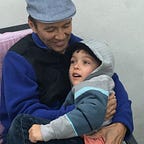What Lies Beneath
A middle-aged woman of limited means inherited some assets upon the passing of her last parent. Being somewhat devout, she decided to make an unusual inquiry before spending the money. Beseeching the Almighty, she asked, “How many years do I have left?”
Unsure she would receive an answer, she was delighted to hear: “One score and ten.”
So she decided to splurge.
She underwent plastic surgery, had a nip here, a tuck there, a facelift and procedures designed to improve the contours of tummy, bust and backside.
Upon being discharged from the hospital, she was in the crosswalk headed for her car when a bus came out of seemingly nowhere and struck her.
The next thing she knew, she was at the pearly gates.
Before St. Peter had a chance to speak, she demanded, “Let me talk to the Big Man.”
When God appeared, the woman asked, “How could You have allowed this to happen? You told me I had another 30 years!”
“Sorry,” replied the Ancient of Days. “I didn’t recognize you.”
A 1982 film, “La Retour de Martin Guerre” (“The Return of Martin Guerre”), based on historical events in 16th century France, tells of a man (played by Gerard Depardieu) who returns, many years after a war and travels, to a small town in France, claiming to be Martin Guerre, a man who used to live in the village. Initially accepted by his wife and the villagers, because he is so familiar with details of the past life of Martin Guerre, he is eventually suspected to be an impostor, and put on trial.
In case you missed this fine film, I’ll stop here and not issue a spoiler alert about the dénouement.
“The Changeling,” a 2008 film by Clint Eastwood, partly based on true events, posits something similar, only this time with a child.
Angelina Jolie plays a single woman whose nine-year-old child goes missing. After several months, a child shows up, supposedly hers. She is convinced the boy is not her son, but the boy and authorities (including the police) insist that he is. When she protests, she is accused of being delusional and an unfit mother, and is even incarcerated.
In this instance, I will say that the instincts of the mother are correct. One might well ask, How is it possible that a mother would not know her own child? How do people expect to get away with such a cruel ruse? And why would they want to?
In more modern times, virtually all of us know of someone who has been the victim of identity theft. It has happened to me more than once. The consequences, fortunately, were relatively mild and merely inconvenient. With some others it has been less so.
Jesus said, “… by their fruits ye shall know them.” — Matt. 7:20
But fruits alone are an insufficient gauge, for Christ also said, “Not every one that saith unto me, Lord, Lord, shall enter into the kingdom of heaven… Many will say to me in that day, Lord, Lord, have we not prophesied in thy name? and in thy name have cast out devils? and in thy name done many wonderful works? And then will I profess unto them, I never knew you: depart from me, ye that work iniquity.” — Matt. 7: 21–23.
More important, then, than externals is what lies beneath the surface. “For as a man thinketh in his heart, so is he.” — Prov. 23:7.
And the heart is notoriously unreliable: “The heart is deceitful above all things, and desperately wicked: who can know it?” — Jer. 17:9.
The classic example of our not being saved by anything we do is that of the thief on the cross, whose life did not merit his being granted a place in the kingdom. Yet, because of his last minute recognition and acceptance of Christ as his only hope of life after death, he will be there.
It behooves us — we who have an opportunity to put our faith into action (“Faith without works is dead” — James 2:17) — to examine ourselves to ensure that we will be in the group on the right hand of God in the judgment, among those He recognizes as His true followers.
How sad — nay, tragic — it would be to have lived a life of outward piety only to discover (and be discovered) that, in the end, we have only been impostors.
